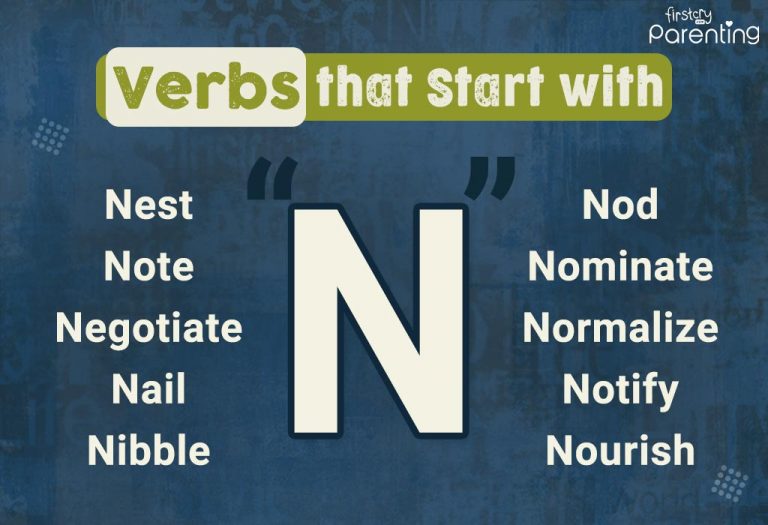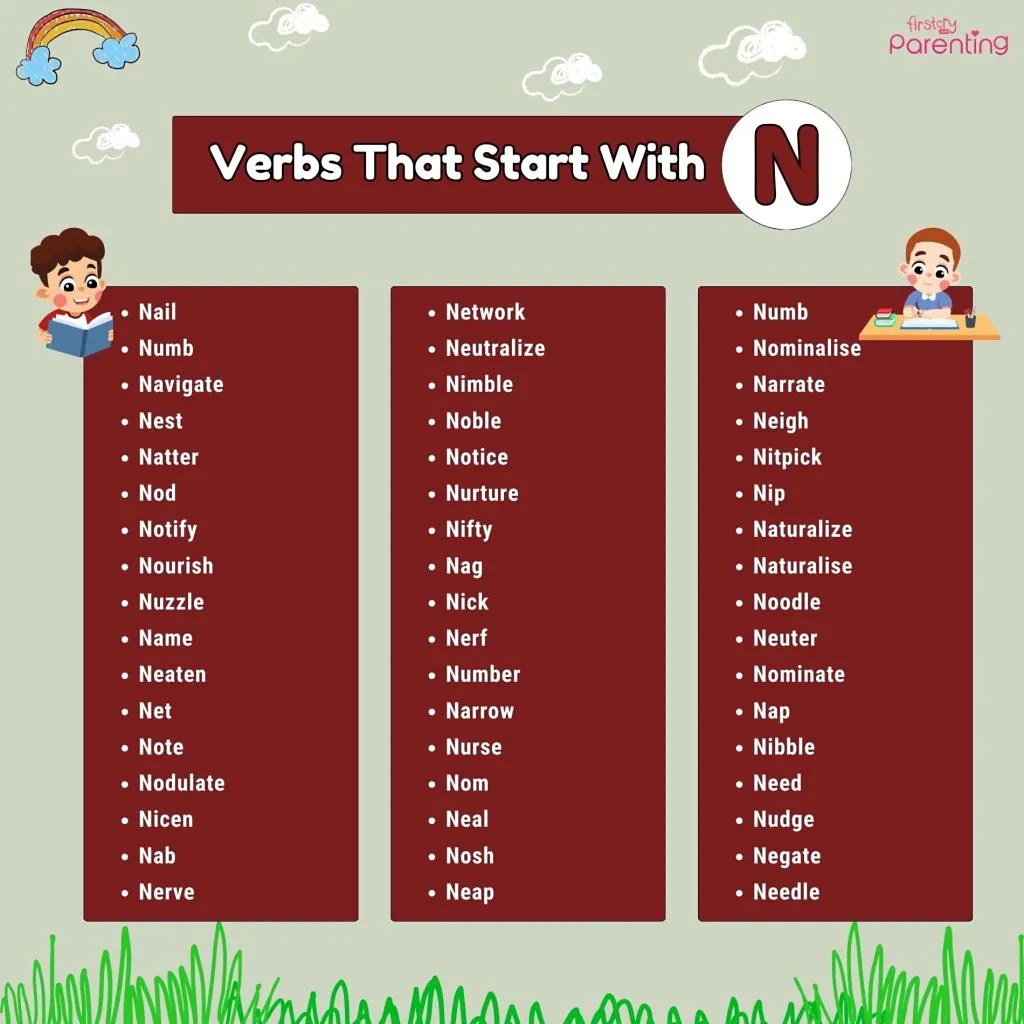Verbs That Start With N in English (With Meanings & Examples)
Improve vocabulary with verbs starting with n including meanings examples and usage for clear English expression.
Navigating English is an incredible adventure when enriching our vocabulary with new words. For our young learners, preschoolers, and kids, this journey is educational and immensely fun. Among the various categories of words, verbs play a crucial role in bringing life and action to our sentences. Today, we’re embarking on a fascinating exploration of verbs that start with the letter “N”. This selection is tailor-made to assist in broadening the vocabulary for kids, making it an invaluable resource for parents, teachers, and children alike.
Whether you’re crafting stories, describing actions, or simply engaging in playful learning, these verbs that start with N for preschoolers and kids are perfect stepping stones in the vast ocean of the English language. Join us as we dive into the meanings and examples of these verbs, ensuring a warm, personal, and engaging experience for our young learners.
What Are the Verbs Beginning With N?
Verbs beginning with N, or simply verbs starting in N, form a diverse group of action words that bring dynamism and clarity to our sentences. These verbs with N encompass a variety of actions, states, and processes, making them essential tools for expressing ourselves vividly and accurately. Whether narrating a story, describing an action, or exploring new concepts, these verbs are the building blocks that help young learners construct meaningful and engaging expressions.
Common Verbs Starting With N
English verbs starting with N are interesting and can help us increase our communication skills. These verbs expand our vocabulary and effectively describe our actions and emotions. Let’s explore 15 such verbs, their meanings and illustrative examples.
1. Nail
To attach or secure with a nail or nails.
Example: He nailed the boards together to build a fence.
2. Narrate
To tell a story or describe a series of events.
Example: She can narrate the entire event without missing a single detail.
3. Navigate
Plan and direct a vehicle’s course, especially by using instruments or maps.
Example: He learned to navigate the ship through treacherous waters.
4. Negate
To nullify or make ineffective.
Example: His apology did nothing to negate the impact of his harsh words.
5. Neglect
To fail to care for or attend to something or someone.
Example: You should not neglect your homework and chores.
6. Negotiate
To discuss something formally to reach an agreement.
Example: The two countries will negotiate a peace treaty next week.
7. Nest
To build or occupy a nest.
Example: The birds nest in the tall trees during spring.
8. Nestle
To settle or lie comfortably within or against something.
Example: The kitten nestled against its mother warmly.
9. Nibble
To bite something gently and in a small amount.
Example: The mouse nibbled on a piece of cheese.
10. Nod
To move your head up and down to signal agreement or acknowledgement.
Example: He would nod in agreement whenever a good point was made.
11. Nominate
To formally suggest someone for a position or an award.
Example: She was nominated for best actress at the award ceremony.
12. Normalise
To bring or return something to a standard or usual condition or state.
Example: Efforts are being made to normalise relations between the two countries.
13. Notify
To inform someone about something, to give notice.
Example: Please notify me when the package arrives.
14. Nourish
To provide the food or other substances necessary for growth, health, and good condition.
Example: A balanced diet is essential to nourish the body properly.
15. Nuzzle
To rub or push against gently with the nose and mouth.
Example: The horse would nuzzle her hand, looking for treats.
These verbs, starting with N, provide a glimpse into the vast array of actions and states we can express in English. Incorporating these verbs into our daily vocabulary enables us and young learners to communicate more effectively and creatively.
Action Verbs That Start With the Letter N
Action verbs that start with the letter N are dynamic words that drive narratives forward, depicting movements or activities. Let’s dive into 15 action verbs starting with N, their meanings and examples.
1. Nabob
To become wealthy or prosperous, primarily through hard work or shrewd business dealings.
Example: Despite starting with nothing, he nabobbed his way into a successful career in finance.
2. Name
To give a name to someone or something.
Example: They decided to name their newborn daughter Lily.
3. Narcotise
To induce a state of unconsciousness or lethargy, typically through the use of drugs.
Example: The tranquilliser dart quickly narcotised the rampaging elephant, allowing wildlife officials to relocate it safely.
4. Neaten
To make neat, tidy, or orderly.
Example: She took a moment to neaten up the living room before the guests arrived.
5. Necrose
To undergo necrosis, the death of cells or tissues due to injury, disease, or lack of blood supply.
Example: The frostbite caused the tissue in his fingers to necrose, necessitating amputation.
6. Nescientise
To cause someone to become unaware or ignorant of something, often by deliberate manipulation or deception.
Example: The propaganda campaign was designed to nescientise the population about the government’s true intentions.
7. Net
To catch or receive (especially fish or a ball in sports).
Example: He managed to net the ball just before it hit the ground.
8. Nicker
Of a horse, to make a low, gentle whinnying sound.
Example: The horses nickered softly as the stable doors were opened, eager to be let out into the pasture.
9. Nictate
To close and reopen the eyelids rapidly, to blink.
Example: The bright lights made him nictate repeatedly, trying to adjust to the sudden brightness.
10. Note
To observe or take notice of.
Example: Please note the changes to the schedule.
11. Nucleate
To form or gather around a central point or nucleus.
Example: The protesters began to nucleate in the town square, rallying against the proposed construction project.
12. Nudge
To push gently or slightly, usually with the elbow.
Example: She nudged her friend to draw attention to the surprise guest entering the room.
13. Nudibranch
To move like a soft-bodied marine mollusk known as a nudibranch, which often moves by undulating its body.
Example: The dancer nudibranched across the stage, captivating the audience with graceful movements.
14. Nullify
To make something legally null and void, to invalidate.
Example: The court’s decision nullified the previous agreement.
15. Numinise
To invest with a sense of divine presence or spiritual significance.
Example: The ancient ritual was meant to numinise the sacred relics, imbuing them with spiritual power.
Incorporating these action verbs that start with the letter N into our language enriches our ability to share experiences and actions with clarity and enthusiasm. These examples showcase how each verb can animate our communications, making them more vivid and engaging.
Positive Verbs That Start With N
Positive verbs that start with N are words that convey uplifting, affirmative actions or states. These verbs are inspirational, highlighting the brighter side of our experiences and interactions. Let’s explore 15 positive verbs starting with N.
1. Nap
To take a short sleep, often during the day, to rest and refresh oneself.
Example: After a long day of hiking, they decided to nap under the shade of a tree.
2. Nab
To catch or seize something or someone suddenly or unexpectedly.
Example: The police officer nabbed the criminal as he attempted to flee the crime scene.
3. Nerve
To inspire or encourage someone to face challenges with courage, determination, and confidence.
Example: His words of encouragement nerved her to speak up despite her initial hesitation.
4. Network
To interact with others to exchange information and develop contacts, especially to further one’s career.
Example: She loves to network at professional events to build her connections.
5. Nexify
To transform something into a nexus or central connection point, often bringing together disparate elements or ideas.
Example: The community centre nexified the neighbourhood, becoming a hub where residents could gather for various activities and events.
6. Neutralise
To make something ineffective by applying an opposite force or effect.
Example: He managed to neutralise the tension in the room with his humour.
7. Nimble
To move quickly and lightly with ease and agility.
Example: The gymnast’s nimble movements on the balance beam captivated the audience.
8. Noble
To conduct oneself with honour, integrity, and high moral principles.
Example: He nobly sacrificed his interests for the greater good of his community.
9. Nobleflect
To reflect or embody noble qualities such as honour, integrity, and kindness.
Example: His actions nobleflected his strong moral character, earning him respect and admiration from others.
10. Notice
To pay attention to or take notice of someone or something; recognising their efforts or qualities.
Example: Always notice the small victories in life; they are stepping stones to more significant achievements.
11. Novelise
To adapt a story or a series of events into a novel.
Example: She decided to novelise her grandmother’s incredible life story.
12. Nuance
To add subtle distinctions or variations to something, often enhancing its depth or complexity.
Example: The artist nuanced the painting with delicate brush strokes, creating layers of meaning and emotion.
13. Nurture
To care for and encourage the growth or development of someone or something.
Example: She constantly nurtures her student’s creativity, encouraging them to think outside the box.
14. Nifty
To be clever, skilful, or ingenious in solving problems or completing tasks.
Example: She demonstrated a nifty approach to problem-solving, finding creative solutions to complex problems.
15. Noble heart
To act with bravery, kindness, and generosity, embodying the qualities of a noble heart.
Example: Despite facing adversity, she nobleheartedly made her way through challenges, always putting others’ needs before hers.
These positive verbs that start with N enrich our vocabulary and enable us to communicate in a way that uplifts and encourages. Incorporating these verbs into our daily language can foster a more positive and supportive environment for ourselves and those around us.
Negative Verbs Beginning With N
While the letter “N’ offers a wide variety of verbs, several carry distinctly negative or neutralising connotations, often describing actions of denial, reduction, or deterioration.
1. Negate
To nullify, deny the truth or existence of something.
Example: His apology was meant to negate the earlier insult.
2. Neglect
To fail to care for or give proper attention to someone or something.
Example: It is cruel to neglect a pet’s basic needs.
3. Nettle
To irritate, annoy, or provoke someone.
Example: His constant whistling began to nettle his coworkers.
4. Nullify
To make something legally void or without effect; to cancel out.
Example: The new evidence could nullify the original contract.
5. Nag
To annoy or irritate someone with persistent fault-finding or constant demands.
Example: She didn’t mean to nag him about cleaning the garage.
6. Narrow
To reduce in scope, extent, or diversity; to limit.
Example: The strict policy will narrow our options significantly.
7. Nauseate
To cause someone to feel sick, disgusted, or revolted.
Example: The graphic images were enough to nauseate any viewer.
8. Nix
To put an end to; to reject, cancel, or forbid something.
Example: The studio decided to nix the controversial scene.
9. Niggle
To cause slight but persistent annoyance, discomfort, or anxiety.
Example: A small doubt continued to niggle at the back of her mind.
10. Neutralise
To render something ineffective or harmless by applying an opposite force.
Example: The base was added to neutralise the acidic solution.
More Verbs That Begin With N
FAQs
1. What are some benefits of learning verbs that start with N for kids?
Learning verbs that start with N can significantly enhance a child’s vocabulary, improve their communication skills, and help them express their thoughts and actions more precisely and creatively.
2. How can parents and teachers help kids learn verbs starting with N?
Parents and teachers can help kids learn verbs starting with N by incorporating fun and interactive activities such as storytelling, games, and practical examples into their learning process, making the experience enjoyable and memorable.
Verbs that start with N are an essential part of the English language, offering a wide range of expressions from daily actions to more complex concepts. By exploring and incorporating these verbs into our vocabulary, we open up new avenues for communication, allowing for more prosperous and precise expressions. Encouraging learners, especially young kids, to familiarise themselves with these verbs can pave the way for enhanced linguistic skills and a deeper appreciation for the nuances of language.
Also Read: Verbs That Start With A to Z
| A | B | C | D | E | F | G | H | I | J | K | L | M |
| N | O | P | Q | R | S | T | U | V | W | X | Y | Z |
Was This Article Helpful?
Parenting is a huge responsibility, for you as a caregiver, but also for us as a parenting content platform. We understand that and take our responsibility of creating credible content seriously. FirstCry Parenting articles are written and published only after extensive research using factually sound references to deliver quality content that is accurate, validated by experts, and completely reliable. To understand how we go about creating content that is credible, read our editorial policy here.














.svg)
















